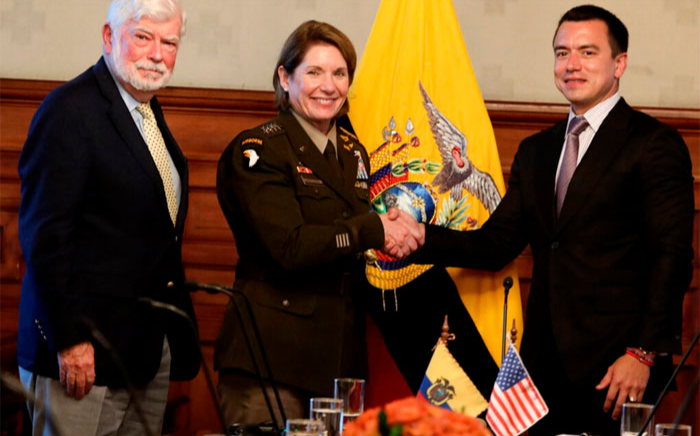
Noboa wants to reactivate military bases in the country
by María Josefina Arce
A proposal for a partial reform of the constitution formulated in recent days by Daniel Noboa has set off alarm bells in Ecuador. With these changes, the president wants to reactivate the military bases in the country and thus the presence of foreign troops, a violation of sovereignty.
The pretext used is the escalation of drug trafficking and organized crime in Ecuadorian territory, which has led many to recall the so-called Plan Colombia, which was presented to supposedly combat drug trafficking in that nation and which deepened the political, economic and military interference of the United States in Latin America.
It also led, according to analysts, to a worsening of paramilitarism, displacement, disappearances and poverty.
In fact, a recent report by the Lawfare Observatory, cited by digital media, points out that the real intention of reinstalling a U.S. military base in the South American country is not to control drug trafficking, nor to help create security conditions, but has to do with geopolitical issues.
Now the president intends to reform Article 5 of the Magna Carta, which prevents the installation of these enclaves, such as the one occupied by the United States for ten years in Manta, Manabí province.
Social organizations denounced at the time that the presence of U.S. troops led to the sinking of ships, the detention and disappearance of fishermen, rape and abuse of women, while bringing no economic benefit to the surrounding population.
The prohibition of military bases is enshrined in the Constitution that emerged from the Constituent Assembly in 2008, under the government of Rafael Correa, and was approved by more than 60% of Ecuadorians in a plebiscite in September of that year.
Although for many Noboa's announcement has electoral purposes in view of the general elections next February, the truth is that it has generated numerous criticisms both inside and outside the Ecuadorian territory. ALBA-TCP, Bolivarian Alliance for the Peoples of Our America - Treaty of the Peoples, pointed out that the proposal of the Ecuadorian president represents a threat to the peace and stability of the region, declared in 2014 in Havana at the Second Summit of the Community of Latin American and Caribbean States.
Although Noboa's project has a long way to go, it has provoked rejection from a large part of society, which considers it an aggression against Ecuador's sovereignty and independence.

